 Petzlover
Petzlover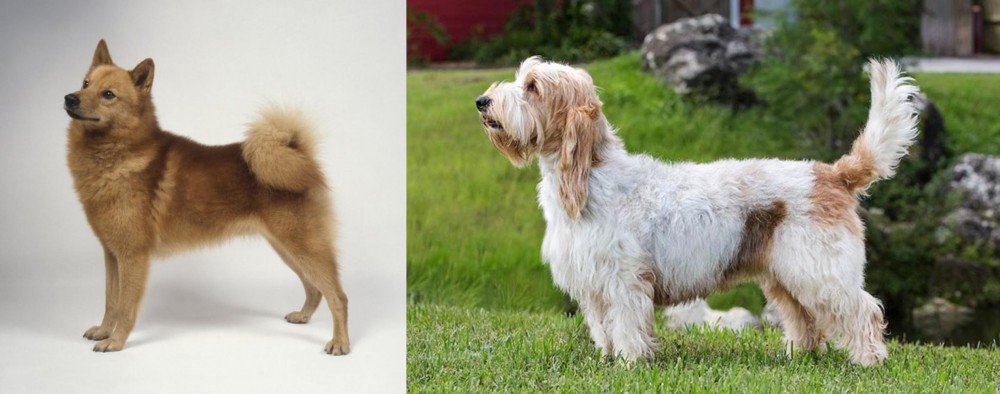 Finnish Spitz is originated from Finland but Grand Griffon Vendeen is originated from France. Both Finnish Spitz and Grand Griffon Vendeen are having almost same height. Both Finnish Spitz and Grand Griffon Vendeen are having almost same weight. Finnish Spitz may live 3 years less than Grand Griffon Vendeen. Finnish Spitz may have less litter size than Grand Griffon Vendeen. Both Finnish Spitz and Grand Griffon Vendeen requires Moderate Maintenance.
Finnish Spitz is originated from Finland but Grand Griffon Vendeen is originated from France. Both Finnish Spitz and Grand Griffon Vendeen are having almost same height. Both Finnish Spitz and Grand Griffon Vendeen are having almost same weight. Finnish Spitz may live 3 years less than Grand Griffon Vendeen. Finnish Spitz may have less litter size than Grand Griffon Vendeen. Both Finnish Spitz and Grand Griffon Vendeen requires Moderate Maintenance.
 The “barking Bird Dog” or Finnish Spitz was Developed in Finland. The breed is fearless and small with a different style than many other hunting dogs. He style of tracking is unusual and he indicated his quarry by barking. He was bred to hunt all sizes of prey from as large as bears to as small as squirrels. He was called the “Barking Bird Dig” because he pointed at the prey by barking and giving the hunter knowledge of the prey and an easy approach to it. In Finland, the Spitz is still a hunting dog. In 1979 The Finnish Spitz became the national dog of Finland.
The “barking Bird Dog” or Finnish Spitz was Developed in Finland. The breed is fearless and small with a different style than many other hunting dogs. He style of tracking is unusual and he indicated his quarry by barking. He was bred to hunt all sizes of prey from as large as bears to as small as squirrels. He was called the “Barking Bird Dig” because he pointed at the prey by barking and giving the hunter knowledge of the prey and an easy approach to it. In Finland, the Spitz is still a hunting dog. In 1979 The Finnish Spitz became the national dog of Finland.
Spitz-like dogs have been present in Finland for over 8000 years. It is believed that dogs living in higher latitudes had more in common with the Taymyr Wolf od North Asia than with the gray wolf. Tests indicate that the chance of the Spitz being related to the Taymyr is between 1.4&a and 27.3%. The Taymyr is extinct today. This shows that the present day dog descends from more than one type of wolf and more than one area. The Spitz was a favorite of the Finno-Ugrian tribes as he helped them find food. These tribes were pretty isolated until 1880. Then the Spitz were mated with other dogs and were almost extinct as a breed separate from all the other local dogs.
However, like many other breeds the Finnish Spitz found a savior. A Finnish huntsman, named Hugo Roos, noticed the native Finnish Spitz while he was hunting up North. He decided to breed dogs that were genuine Finnish Spitz without the blood of other breeds mixed in. After thirty years the current day Finnish Spitz was born.The latest breed standard was confirmed by the Love Finnish Kennel Club in 1996.
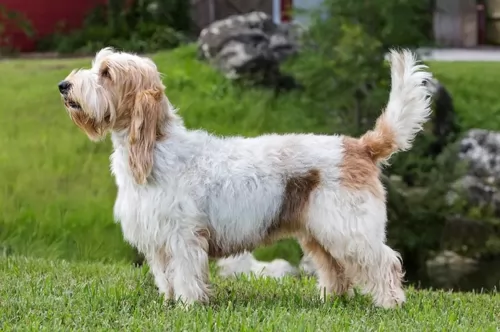 The Grand Basset Griffon Vendeen is a French scenthound that has changed over many centuries. Today the area in France where they originate from, has contributed to the dog's looks.
The Grand Basset Griffon Vendeen is a French scenthound that has changed over many centuries. Today the area in France where they originate from, has contributed to the dog's looks.
The rocky and thorny region of Vendeé required a hardy breed of dog. Also, hunters wanted a slower hound that they could keep up with and the idea was to shorten the legs of the dog.
By the end of the 19th century, the Basset Griffon Vendéen was developed. By the 1950s, the Grand was considered a separate breed.Today the dog is a long-backed and short-legged hunting dog.
 The Finnish Spitz is balanced and symmetrical in body and females are longer than males. They have a very distinguishable prick, foxy ears and face. They have a smiling expression and a curved tail. They are a golden-red color with a double coat. The under coat is dense and soft While the top coat is stiff. Puppies often look like little red fox cubs. When born they are black, grey or brown with a lot of black. As an adult the pups grow up to be a mix of fawn and dark black. Lips, nose and rims of the eyes should be black.
The Finnish Spitz is balanced and symmetrical in body and females are longer than males. They have a very distinguishable prick, foxy ears and face. They have a smiling expression and a curved tail. They are a golden-red color with a double coat. The under coat is dense and soft While the top coat is stiff. Puppies often look like little red fox cubs. When born they are black, grey or brown with a lot of black. As an adult the pups grow up to be a mix of fawn and dark black. Lips, nose and rims of the eyes should be black.
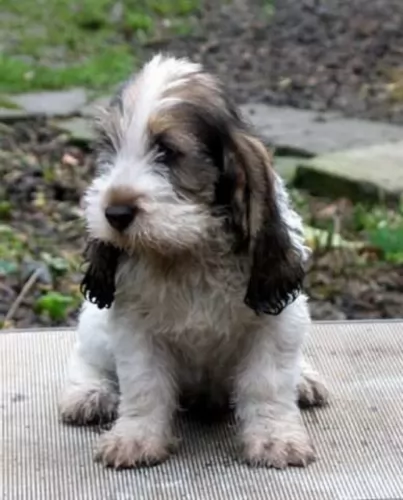 Kept today essentially as a domestic pet, the Grand Basset Griffon Vendéen is a strongly built dog, a rough-coated scent hound of medium size standing at roughly 39 to 45cm in height and weighing 18 to 20kg.
Kept today essentially as a domestic pet, the Grand Basset Griffon Vendéen is a strongly built dog, a rough-coated scent hound of medium size standing at roughly 39 to 45cm in height and weighing 18 to 20kg.
The coat is medium length, shaggy and wiry. It is essentially white with orange markings. Sometimes he can be tri-colored, having a combination of orange, black or tan markings. The double coat is actually regarded as his defining characteristic, being shaggy with a wiry texture that sets him apart from other hound breeds.
His legs are straight, and he is longer than he is tall. He is a deep chested dog with long ears and a long tail. He is also noted for his mustache and beard with long eyebrows.
Your Grand Basset is a courageous, happy, confident dog. He is active and has great stamina. As a social, pack dog, he likes plenty of time spent with his owner, failing which the owner should invest in another dog too so as to be part of a pack. He will get on great with children and he is also a pet-friendly breed who will get on well with cats too. He is sharp and alert and responds well to training and socialization.
 Very child friendly – loves to play with children as long as the children pay attention to them. If not, the Spitz will go elsewhere.
Very child friendly – loves to play with children as long as the children pay attention to them. If not, the Spitz will go elsewhere.
They are independent thinkers and close to family but not strangers. They often “yodel” instead of howl.
Needs to be with people, bonds deeply with his humans. Most get along well with other dogs but because of their hunting instinct they are not good with small pets or birds.
They are smart and learn easily. They are great athletes and learn games and competition well.
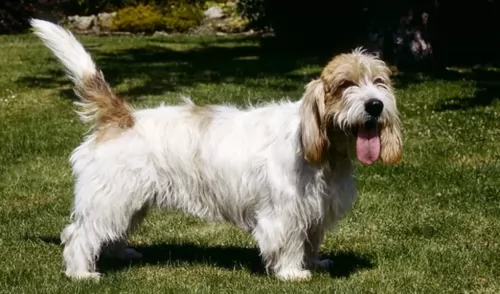 This long-backed, short legged hunting dog has a happy, confident personality. While he was used originally for hunting, he is now commonly kept as a companion.
This long-backed, short legged hunting dog has a happy, confident personality. While he was used originally for hunting, he is now commonly kept as a companion.
He is energetic and independent and will require you having him join you for walks and a ball game too.
Non-aggressive and adaptable he can live in the city or in the countryside so long as he receives plenty of attention and love – then he'll be a splendid pet.
 Typically, a somewhat healthy breed, the Finnish Spitz does struggle with a few genetic concerns. They have been known to suffer from:
Typically, a somewhat healthy breed, the Finnish Spitz does struggle with a few genetic concerns. They have been known to suffer from:
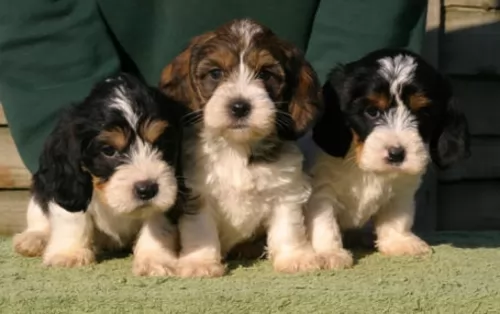 There are some Basset Griffon Vendéens that have reached 17 years of age. This is excellent for these dogs, and lifestyle, nutrition and exercise can all play a part in the longevity of any dog. While he is a pretty robust canine, you'll want to be aware of some of the diseases which may require veterinary intervention.
There are some Basset Griffon Vendéens that have reached 17 years of age. This is excellent for these dogs, and lifestyle, nutrition and exercise can all play a part in the longevity of any dog. While he is a pretty robust canine, you'll want to be aware of some of the diseases which may require veterinary intervention.
Cancer is a major cause of death in elderly dogs, but if caught early, the dog can be cured. These cancers can be malignant lymphoma, skin cancer, bone cancer or soft tissue sarcomas. You'll notice a lump on your pet or a wound that won't heal. When you notice your dog not feeling well, get him to the vet.
Common forms of heart disease in dogs is valvular disease, heart-worm disease and myocardial disease. The signs of heart disease in your pet will depend on the severity of the disease and type.
As heart disease moves on to congestive heart failure, you'll notice symptoms such as difficulty with breathing, fatigue, loss of appetite and weight loss. You need to get your dog immediately to the vet.
Dog allergies can be caused by pollen, medications, food or insects. Your pet will be scratching, he'll have watery eyes and inflamed skin. This inflammatory condition can cause a lot of agony for your pet, driving him mad with the itch and pain. Relieve his discomfort by getting him to the vet as soon as possible.
 Don’t overfeed the little guy. The Spitz had a good appetite for a dog its size and can gain weight quickly . Feed twice a day about 1/8th of a cup.
Don’t overfeed the little guy. The Spitz had a good appetite for a dog its size and can gain weight quickly . Feed twice a day about 1/8th of a cup.
The same advice hold for the adult dog. Feed 1/4th of a cub of high quality dry food twice a day.
When the Spitz is a puppy you should limit strenuous exercise and jumping. Don’t spay neuter at too young an age. Wait until they are mature at 3-5 years of age.
Again do not exercise vigorously at too young an age. When older the Finnish Spitz will need a yard to run in and exercise to satisfy his hunting instincts. A long walk every day is a must.
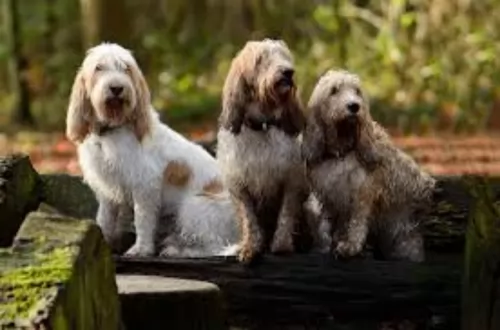 If you are going to be feeding your Grand Basset Griffon Vendéen kibble, there are manufacturers who bring out excellent foods which are breed-specific formulas for age, size and energy levels of dogs.
If you are going to be feeding your Grand Basset Griffon Vendéen kibble, there are manufacturers who bring out excellent foods which are breed-specific formulas for age, size and energy levels of dogs.
Feeding a dog is an individual choice, but good food can increase his longevity. A bit of raw meat mixed into his kibble, or some cooked brown rice, vegetables and chicken will be excellent for him and can add some tasty variety to his diet.
Fresh, cool water must always be available at all times.
The Grand Basset Griffon Vendeen’s coat is double and the rough, harsh coat will need brushing twice a week and stripped once a year.